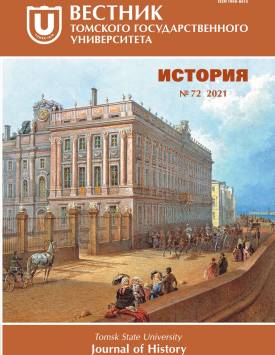On the issue of the genetic origins of the Yakut epic formation
The article analyzes the state of knowledge of the problem of the origin of olonkho in order to determine the genetic origins of the Yakut epic formation, and to find out its ethnic background. V.L. Seroshevsky, G.V. Ksenofontov, P.A. Oyunsky in their writings first paid attention to the southern origin of the Yakut epic and tried to prove the antiquity of the Yakut epic and its southern ancestral homeland. The conclusion of A.P. Okladnikov outlined two areas of study of the historical and cultural roots of the Yakut epic - the Turkic and Mongolian. In the studies of I.V. Pukhov, G.U. Ergis, N.V. Emelyanov, D.T. Burtsev, V.M. Nikiforov, A.I. Gogolev, V.F. Ermolaev, etc. the general idea is emphasized that the genealogical affinity of the Yakut heroic epic with the epics of other Turkic peoples may have occurred in the far reaches of Southern Siberia, because immediate ancestors of Yakuts were found in the Baikal region and then in the Lena basin in deep isolation from the entire Turkic world. As the degree of study of the problem shows, four main points of view on the problem of the origin of olonkho have emerged. The first conceptually substantiated by P.A. Oyunsky, considering the time of the creation of olonkho the era of Genghis Khan. The second point of view has extensive supporters, beginning with V.L. Seroshevsky to modern researchers. They relate the time of the appearance of the olonkho to the ancient Turkic epoch, or to the period not later than the thirteenth century. According to V.F. Ermolaev, for example, the events of the 6th-8th centuries, occurring in the ancient Turkic khaganate, directly formed the basis of Yakut epic legends, in particular, the acts of Bilgekagan and his younger brother Kultegin are comparable to the exploits of Nyurgun Bootur and Yuryung-Uolan. The third point of view was held by G.U. Ergis and N.V. Emelyanov. Although the origins of the olonkho originate in the south, when the ancestors of the Yakuts lived together with the ancestors of other Turkic-Mongolian peoples somewhere in Southern Siberia, its composition as a genre is connected with a historical being on the Middle Lena. The fourth point of view on the existence of the Yakut epic for at least two thousand years adheres to V.M. Nikiforov. As a result of a comparative analysis of research on the problem, the time and place of the initial formation and further development of the Yakut olonkho were revealed: its formation occurred in the first millennium BC in a society of militant and united cattle-breeding tribes of nomadic type; its composition is connected with the epic of the Hun tribes; further development occurs in the 6th-8th centuries AD - during the period of the Turkic Khaganate in the Turkic-Mongolian world; the independent existence of the Yakut olonkho began in the 40s of the 8th century, when the historical ancestors of the Yakuts - the Kurykians broke away from the rest of the Turkic world and headed north to the areas of the upper and middle reaches of the river Lena. The presented article can become a starting point for new developments of problems of comparative-historical study of the Yakut olonkho with the epics of other Turkic-speaking peoples and development of new, modern approaches to its study.
Keywords
the origin and development of olonkho, historicism, the Hunnic tribes, the Kurykans, the Turkic Khaganate, the Turkic-Mongolian worldAuthors
| Name | Organization | |
| Ivanov Vasiliy N. | M.K. Ammosov Norh-Eastem Federal University | institute-olonkho@mail.ru |
| Koriakina Antonina F. | M.K. Ammosov Norh-Eastem Federal University | aitalilen@mail.ru |
| Anisimov Ruslan N. | M.K. Ammosov Norh-Eastem Federal University | teployakutia@mail.ru |
References

On the issue of the genetic origins of the Yakut epic formation | Tomsk State University Journal of History. 2021. № 72. DOI: 10.17223/19988613/72/23
